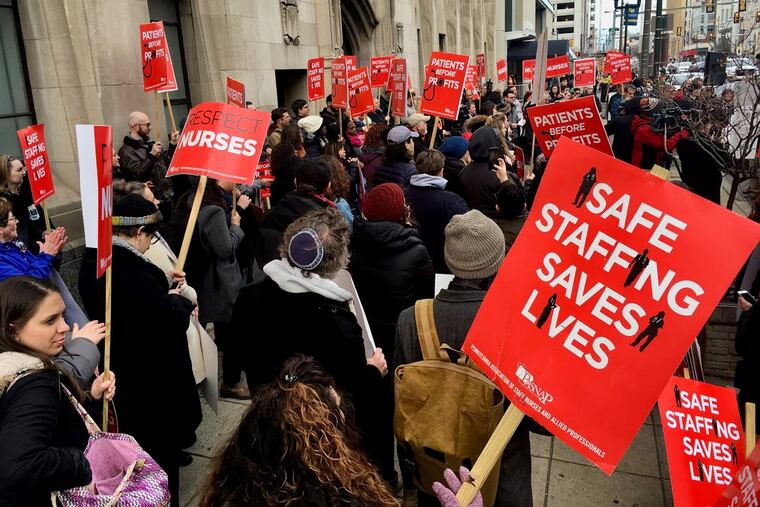Nurses are overworked. Staffing limits are the answer. | Opinion
We fight for enforceable nurse staffing limits in our contracts to ensure that patients get the attention from nurses that they need.

Health care is changing — and not for the better. As frontline nurses serving at-risk populations, we see the impact of poverty, racial and economic discrimination, and public health inequalities every day. Our patients bear the impact of inadequate staffing from hospitals, in a time when profit — not people — is the key driver of our health care system.
But there is one type of organization in the trenches fighting back against the corporatization of health care: unions. The Pennsylvania Association of Staff Nurses and Allied Professionals, of which I am president, is a rapidly growing, 8,300-member union dedicated to ensuring that nurses have the resources they need to provide care that gets people healthy. In the past five years alone, more than 3,000 nurses in the Philadelphia area have joined PASNAP. In our conversations with other nurses who want to join PASNAP, by far the most important reason they offer is that nurses are overworked and see patients suffer as a result.
» READ MORE: To fix staffing crises, hospitals in Pa. and beyond must listen to nurses | Opinion
That’s why we fight for enforceable nurse staffing limits in our contracts to ensure that patients get the attention from nurses that they need. Studies of California’s landmark nurse-to-patient ratios law, implemented since 2004, show that setting reasonable limits on the number of patients who can be safely cared for by a nurse improves nurse retention, reduces burnout, and improves patient outcomes. In Pennsylvania, we have state-mandated limits on the number of well children who can be cared for in child care facilities by a child care worker, yet there is no limit to the number of sick children who may be cared for by a nurse.
Critics of safe-staffing legislation have argued that it is a “one-size-fits-all” approach that reduces the management discretion of hospital administrators. But nurses know that every patient needs their attention. If we are assigned too many patients, we just aren’t able to do our jobs. Our working conditions are patients’ healing conditions.
Through our union, we have a seat at the table where the decisions are made, and we use our collective voice to advocate for our patients by setting safe staffing limits.
The days of neighborhood charity hospitals led by and acting in the interest of the community are gone. These days we have massive conglomerates, whether for-profit, or ostensibly “nonprofit” with huge executive compensation plans, a corporate health care model overwhelmingly focused on the bottom line, and management who only pays attention to workers once they organize a union.
Right now, 1,400 nurses are bargaining contracts at Hahnemann University Hospital and Saint Christopher’s Hospital for Children. Across the table, we face Paladin Healthcare/American Academic Health System, a for-profit private company that is incentivized by both practice and law to create profits, not healthy patients. We serve a population disproportionately on the receiving end of an unjust society racked by soaring wealth and income inequality and racial discrimination. We provide care to people left behind. But we need the resources to do it — that is, enough nurses via enforceable staffing limits, and the pay and benefits needed to retain nurses for the long haul.
By organizing together as nurses, we can advocate for the communities we serve, and we can get Paladin to see the light. But that’s because we’ve applied pressure and shown our unity.
We’re also fighting for our entire profession in Harrisburg. That means enforceable nurse staffing ratios enshrined in state law. This session, lawmakers will be reintroducing safe staffing legislation that will put Pennsylvania on the same terrain as California. California’s nurses have lower burnout rates than Pennsylvania, higher satisfaction rates, and 14 percent lower surgical death rates than Pennsylvania, according to a 2010 study by researchers at Penn. We need as many people as possible to contact their legislators and urge them to support safe staffing legislation.
As we fight for our patients, our nurses experience the power of joining together in a union. But we can’t do it alone. Whether you’re a nurse, a patient, or a potential patient, we need your support in this struggle.
Maureen May, RN, is president of the Pennsylvania Association of Staff Nurses and Allied Professionals.